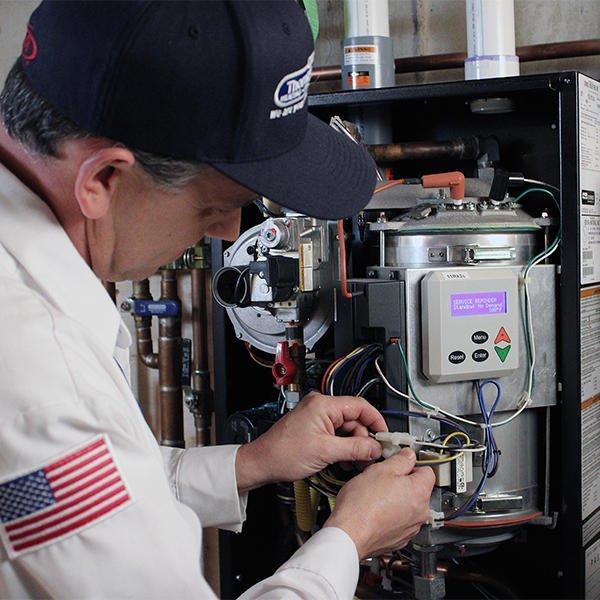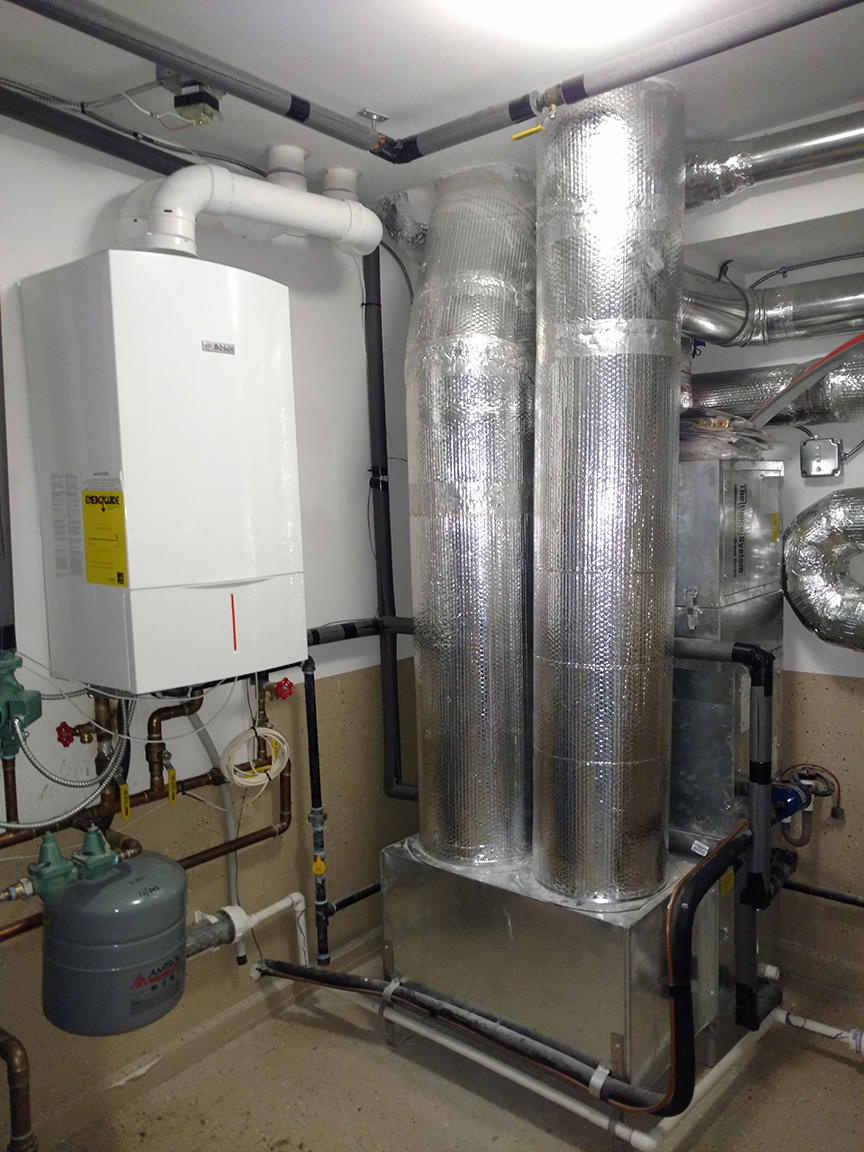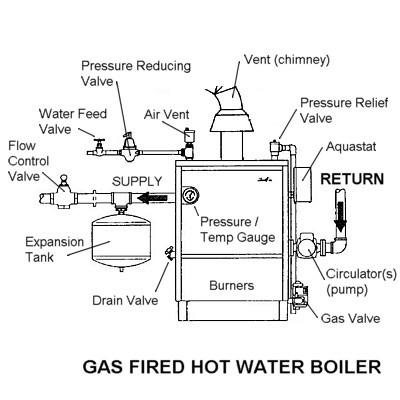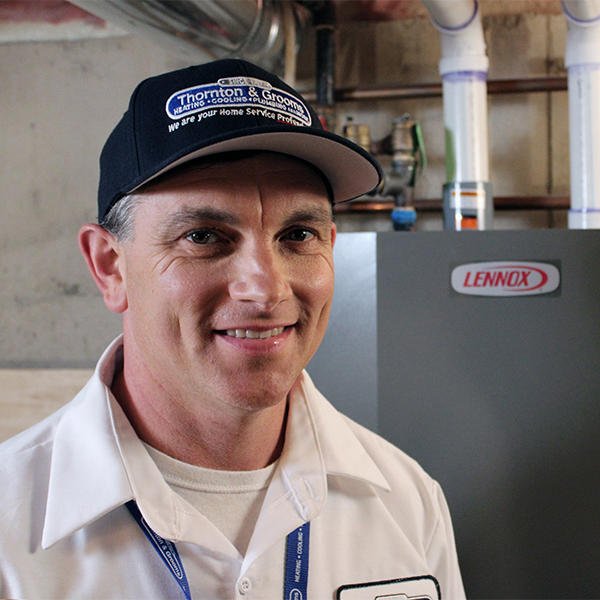Improving the Energy Efficiency of Your Boiler

Want to improve your boiler’s energy efficiency?
If you have a boiler, you may be able to make some minor adjustments, or “retrofits,” to improve the energy efficiency of your unit. These adjustments are significant because the more energy efficient your boiler is, the less it will cost to operate.
Before you head off to the hardware store, you should evaluate whether the potential cost savings of retrofitting your boiler are greater than the cost savings of purchasing a new high-efficiency boiler. Typically, we recommend replacing your current boiler with a new, more energy efficient one if it’s close to 15-20 years old.
On average, a new boiler costs around $13,500; if a new boiler is more energy efficient than your current one, you may get more long-term cost savings by purchasing a new boiler.
In this blog, we’ll break down boiler retrofits for each type of boiler to help you make the best choice for your home. We’ll cover:
- How boilers work and boiler types
- How to measure boiler efficiency
- Retrofits for all boiler types
- Retrofits for specific boiler types
Would you rather have a professional technician’s help ASAP?
We can walk you through your boiler retrofit options. Thornton and Grooms’ HVAC experts are here to help! Call us at (248) 644-7810 or contact us today to schedule an appointment.
How Boilers Work and Boiler Types
Boilers heat water, which in turn heats your home’s air. The boiler's burner ignites the fuel, uses the energy to heat water in its heat exchanger, and then distributes the heat throughout your home via pipes.
Boilers vary by energy source and heat source. The type of boiler you have can impact your retrofit options.
- Gas boilers, the most common type of boiler, are the least expensive to install. Gas boilers heat water using natural gas or propane as the fuel source.
- Oil boilers are generally more expensive to operate than gas boilers. They require an oil tank to house heating oil or biodiesel to fuel the boiler.
- Electric boilers heat water using electricity. While they are the most energy efficient type of boiler, they can be expensive to operate due to the high cost of electricity.
All three types of boilers can either heat your home with hot water or steam.
- Steam boilers distribute steam via pipes to radiators.
- Hot water boilers distribute hot water via pipes to baseboard radiators or radiant floor systems.
Depending on the type of boiler you have, it may be more or less energy efficient at baseline.
How to Measure Boiler Efficiency

A boiler's yellow EnergyGuide label will tell you the AFUE rating for it. / Source: Department of Energy
Annual Fuel Utilization Efficiency (AFUE) percentage measures a boiler's efficiency. The AFUE percentage measures how much energy your boiler uses to heat air is lost as exhaust.
For example, if your boiler has an AFUE percentage of 85%, it would mean it is wasting 15% of its energy heating exhaust. Standard boilers are in the 80–85% range, while high-efficiency boilers are 90–99%.
Several additional factors impact the efficiency of your boiler, including:
- Fuel type. In general, electric boilers are the most efficient, and gas boilers are the least efficient.
- Steam or hot water boiler. Hot water boilers are more efficient than steam boilers because it takes less energy to heat water than transform it into steam.
- Pipes and ducts. According to Energy Saver, leaky pipes or ducts can cause an energy loss of up to 35%.
- Condensing vs. non-condensing boiler. Condensing boilers are more energy efficient because they condense waste heat and use it to preheat water.
- Sealed or non-sealed boiler system. Non-sealed systems are less efficient because they direct exhaust gases up your chimney, a process that requires energy.
- Boiler size. If your boiler is too small for your home, it may take added energy to heat. If it’s too big for your home, it may be making more heat than you need.
Before making any retrofits to your boiler system, review the factors above, as they may limit the efficiency of your system. If you find your boiler has low efficiency due to several factors, it might be more cost effective to replace your boiler with a high-efficiency boiler system.
Note: If your boiler has a sudden change in efficiency—for example, if your energy bills suddenly increase or your boiler is no longer heating your home to a comfortable temperature—your boiler may require a repair or replacement. Check out our guide on when to replace your boiler for more information.
Retrofits for all Boiler Types
Regardless of which type of boiler you have, there are several things you can do to increase your boiler’s energy efficiency, including installing a smart thermostat, adding a vent damper, and derating your gas burners.
Installing a Smart Thermostat
Smart thermostats help reduce excess energy use by allowing you to adjust your home's temperature to suit your unique schedule. With a smart thermostat, you help prevent your boiler from turning on and heating your home when your house is empty.
Adding a Vent Damper
A vent damper blocks your boiler’s vents when your boiler isn’t running and ensures saving any residual heated air in the system for the next heating cycle. A vent damper should be installed by a professional.
Derating Gas Burners
Derating or down-firing your gas burners involves installing a smaller nozzle on your gas burners. With a smaller nozzle, your boiler uses less fuel, cutting fuel costs by up to 10%. Derating your gas burners must be done by a professional.
Retrofits for Specific Boiler Types

Gas boilers have aquastats that control their hot water temperature.
Depending on the type of boiler you have, there are a few additional retrofit options:
- Installing an intermittent ignition device (gas boilers only)
- Adding a barometric flue damper (oil boilers only)
- Modulating the aquastat (hot water boilers only)
Installing an Intermittent Ignition Device
If you have a gas boiler, then your fuel is probably ignited by a pilot light. Pilot lights continuously burn a small amount of fuel to keep the pilot light lit, making them very inefficient.
An intermittent ignition device reduces fuel usage by only igniting fuel when the boiler is on. These devices cost about $250, have a payback period of around 10 years, and must be installed by a professional. If you have an older boiler that will require replacement in the next 10 years, installing an intermittent ignition device will not be cost effective.
Adding a Barometric Flue Damper
A barometric flue damper is a vent that adjusts the amount of heat escaping from your chimney. If you have an oil boiler, adding a barometric flue damper (which costs about $100) could help you save up to 5% in heating costs.
Modulating the Aquastat
Aquastats control the temperature of the hot water in your boiler. During the spring and fall, your boiler does not need to use as much energy to heat your home as it does during the winter since your home’s ambient temperature is more comfortable during spring and fall. Without modulating (adjusting) the aquastat, your boiler heats the hot water to the same temperature as it does during the winter, wasting energy.
Installing a modulating aquastat costs several hundred dollars but can save you up to 10% in fuel costs. A cheaper alternative is to adjust the aquastat yourself during the spring and fall. You might need a service call with an HVAC technician to learn how to locate and adjust the aquastat.
For Personalized Advice on How To Increase the Efficiency of Your Boiler, Contact Thornton and Grooms.

Contact a Thornton & Grooms professional HVAC technician to improve your boiler’s efficiency.
At Thornton & Grooms, we put Michigan homeowners before profit. Our friendly and respectful team members will provide you with options to help you make the changes to your boiler system that are right for you. Trained boiler specialists will inspect your current boiler system and provide upfront, flat-rate recommendations.
Schedule an appointment today by calling us at (248) 644-7810 or clicking the button below!
- Tagged:
- Tips
